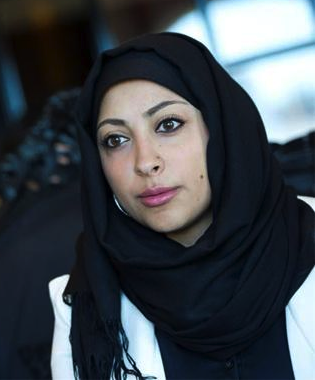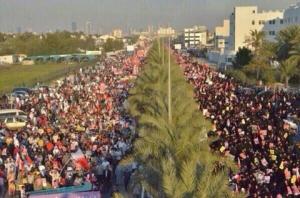Posts Tagged human rights protests
Change in Bahrain is needed now, not in another three years
Posted by World Without Torture in Advocacy and Influencing Policy, From our members, Justice, Middle East North Africa, News & Clippings, On the Forefront, Prevention, Rehabilitation, Voices on 21/02/2014
Despite a strong government crackdown on protestors, over 300,000 people took to the streets of Bahrain’s capital Manama on 14 February to mark the three-year anniversary of the Bahraini protests.
And despite three-years of torture, imprisonment, and even deaths of protestors, the demonstrations against the government do not seem to be slowing down.
But also what is not slowing down is the government’s resistance to relinquishing power to the people. On the anniversary march alone, over 50 people were injured by rubber pellets and tear gas fired by police.
The last three years have seen the Bahraini government, the House of Al Khalifa, use extreme force over protestors whom are campaigning for respect for human rights. In every protest, the government has repelled the protestors with the use of force. The result over three years is shocking: according to data from The Bahrain Center for Human Rights (BCHR), 93 people have died; more than 2,200 political prisoners remain in detention; and torture and enforced disappearances remain widespread on a daily basis.
The Bahrain Center for Human Rights (BCHR) has tracked the uprising since day one and Maryam Al-Khawaja, Acting President of the BCHR following the arrest of President Nabeel Rajab, knows in detail the harm the government can cause.
Her father, prominent human rights defender Abdulhadi al-Khawaja, has been imprisoned since April 2011 for allegedly plotting a coup during the pro-democracy protests. Maryam’s sister Zainab – who was recently released from detention – still faces a string of ‘anti-government’ charges. They are just two cases out of thousands who have been silenced by the government.
“People seem to assume that somehow the Bahrain revolution failed but I do not think it is fair to assess the revolution as ‘failed’,” said Maryam Al-Khawaja in a piece to World Without Torture. “It is just an inconvenient revolution – a revolution which is happening in a country which is solidly linked to the interests of the West in terms of oil, trading and so on that it would prove problematic to recognise as an active, powerful movement.”
Three years on, her assessment certainly still seems accurate. Aside from the occasional news report online, the world seems oblivious to Bahrain: the country is still portrayed as a safe haven for foreign investment and tourism; and large-scale international events, such as the Formula One Grand Prix, still continue to uphold the myth that Bahrain is free from unrest.
Yet the sheer numbers of protestors marking the importance of the ‘revolution’ tell a different story about the realities of Bahrain: its people want a democratic change from the 230-year-old Al Khalifa rule.
With human rights coming into question on a daily basis, it is a change that is needed – now, not in another three years.
Middle-East’s blind spot: for how long can we ignore Bahrain’s “inconvenient revolution”?
Posted by World Without Torture in Advocacy and Influencing Policy, Justice, Middle East North Africa, News & Clippings, Prevention, Rehabilitation, Voices on 23/10/2013
 Amidst the Copenhagen bustle sits 26-year-old Bahraini human rights defender Maryam al-Khawaja who, on the face of it, appears to be oblivious to her anxieties. These are perhaps the only two minutes to relax from her work at the Bahrain Center for Human Rights.
Amidst the Copenhagen bustle sits 26-year-old Bahraini human rights defender Maryam al-Khawaja who, on the face of it, appears to be oblivious to her anxieties. These are perhaps the only two minutes to relax from her work at the Bahrain Center for Human Rights.
Maryam has just been discussing her father, prominent human rights defender Abdulhadi al-Khawaja, who has been imprisoned since April 2011 for participating in the pro-democracy protests which swept the nation of Bahrain.
Tortured ever since – including beatings so severe he underwent urgent surgery to reconstruct his jaw in 2011 – Abdulhadi’s case looks increasingly desperate. But Maryam manages to distance herself from this well.
“It is another case indicative of the repression exercised by the rulers of Bahrain,” she says flippantly. “In 2011, I wrote a report about a man who had been beaten to the point that no one recognised him.
“I was told at the end of the report that the man who had been tortured was my father. My initial reaction was not to break down but to finish the report. There are so many other torture cases and personalising them does not help my work. You need to normalise it. In my head, most of the time my father is not even in prison.”
But the fact is that along with thousands of other pro-democracy protestors, Maryam’s father, and sister Zainab, wallow in the horrifying conditions of Bahraini prison with little chance of a fair trial or basic human rights.
“There is torture in the prisons,” says Maryam. “The international community focus so much on improving conditions for prisoners when, in reality, these political prisoners should not be detained in the first place. Their release should be called on and they should have assured prison qualities until that point.”
The ‘failed’ revolution?
Yet pressure on the ruling family of Bahrain to accept their shameful human rights record is something which Maryam cynically believes will not be applied by the international community. “People seem to assume that somehow the Bahrain revolution failed but I do not think it is fair to assess the revolution of Bahrain as a ‘failed’ revolution,” she says. “It is just an inconvenient revolution – a revolution which is happening in a country which is solidly linked to the interests of the West in terms of oil, trading and so on that it would prove problematic to recognise as an active, powerful movement.”
We’re talking with each other in the same week that Syria has dominated the news – a humanitarian crisis which has seen millions of people seek refuge in nearby countries.
In this field of vision, Bahrain has become lost. The revolutionary protests which screened all over the world almost three years ago in early 2011 seem long forgotten.
“Bahrain is such a controlled country that now the protests are rarely seen. People are fearful that if they go to the wrong street, or even to the shops in their area, they will be arrested, tear gassed, tortured and so on. They therefore do not have the safety, inclination or room to go into the streets and protest like you would perhaps see elsewhere. And that’s one reason why it does not get coverage. The ruling family of Bahrain know this.”
The Bahraini royal family, the House of Al Khalifa, assumed power approximately 230 years ago and have yet to relinquish it. Indeed half of the current Parliament in Bahrain are aligned to the family and the country’s only unelected Prime Minister, who has been in his position for 43 years, is related to the family also, being the uncle to the current self-declared king, Hamad bin Isa Al Khalifa.
It is this monopolised rule which led to the protests in April 2011 – protests which have, in fact, been occurring regularly since the 1920s’ and before.
Sectarian myth
In the 1950s’ a group called Intifadat al-Haya’a, led by the religious leaders of both the Sunni and Shia communities, started an uprising for civil rights. At this time Bahrain was still a British protectorate so with the help of the British the Bahraini regime crushed this opposition and arrested all of the leading figures..
“The Al Khalifa family knew that if the Sunni and Shia communities stayed united it could spell the end of their rule,” explains Maryam. “So since the 1950s’ the family has been focusing their attention on marginalizing the majority of the country, the Shia community, thereby sidelining their biggest threat. They created this ‘us and them’ fashion through labeling the Shia community more and more, to make it impossible for them to integrate with the Sunni community and, as such, crush any uprising. This is not saying that Sunnis benefit entirely from the Bahrain rulers, because they do not. But it is just one move into the ruling party’s idea to change the demographic of the country so it is majority Sunni rather than Shia.”
This sectarianism is, according to Maryam, just another tool of gaining control by the royal family.
“The family see everyone as an enemy yet portray to Western media that there is a sectarian problem, not a problem between the rulers and the people,” she says.
“It is simply not true. Bahrain is not a sectarian problem. It’s a human rights problem. People, no matter who they are, have no room for freedom of expression, right to safety and so on. People are beaten, tortured and detained on a mass scale – and why? All because they want to exercise their human rights.”
But what can be done to bring change in Bahrain and, in the first instance, call the human rights record of the Al Khalifa family to attention?
International pressure
“You do not need military feet on the ground,” states Maryam. “What you need is pressure on the Bahraini government to accept the evidence we already have, in relation to sanctions against individuals like visa rejections, torture documentation and so on. What you need is for the countries who claim that they promote human rights and democracy to uphold these values – not among their enemies, but among their friends. Bahrain is a friend which is not upholding basic human values, but that would be an embarrassing thing to admit.
“At least in Egypt there is a sphere to go out on the streets and protest. But in Bahrain, public space is controlled in a suffocating manner . In that sense it is not really similar to other protests in the Middle East and is actually more similar to Rwanda – not that there will be a genocide, but there will come a time when something which as been silently bubbling will explode into the open. There is absolutely no room for expression, for freedom of speech or to manoeuvre.”
Fittingly, in the same way I misinterpreted the calmness in Maryam at the coffee shop, it seems Bahrain has a hidden undercurrent of turmoil.
“Everything seems alright and as if changes have been made. But there is always something happening underneath [in Bahrain],” says Maryam. “Distancing ourselves from this turmoil only makes it worse. The time is now for the international community to apply pressure on Bahrain and bring the human rights abuses to light.”
Written by Ashley Scrace, Communications Officer at the IRCT

